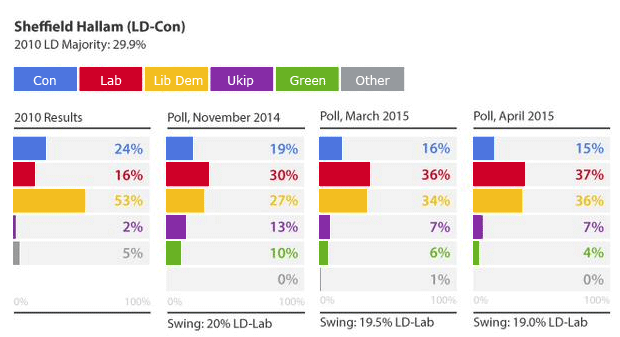
As you’ve probably heard dozens of times, next week’s general election will be messy and unpredictable. Sturgeon fever, the rise of Ukip and the collapse of the Lib Dems look set to have a profound effect on the make-up of the next parliament.
Seats will swing, and some very major political figures could be booted ingloriously out of the Commons. Here are three of the highest-profile politicians who may not get the outcome they hope for come Thursday.
Nick Clegg, Deputy Prime Minister
Constituency: Sheffield Hallam
Following an assured performance on the first televised election debate of 2010, Clegg’s popularity surged nationwide. The Lib Dem leader held Sheffield Hallam – yellow for over a decade – with ease.
But Clegg’s participation in the Con-Lib coalition – specifically his failure to scrap undergraduate tuition fees as pledged – caused his popularity to nosedive. A recent poll by Conservative peer Lord Ashcroft has Labour candidate Oliver Coppard ahead by a single point following a 19-point swing away from the Lib Dems. If this result is repeated on 7 May, Sheffield Hallam will elect a Labour MP for the first time in history (see below).
Source: Lord Ashcroft
Clegg, however, remains confident – private Lib Dem polling of the constituency puts him “firmly ahead”. But if Clegg actually lost his seat, the consequences would be huge. The ousted Clegg would probably be replaced as Lib Dem leader by Vince Cable, “notoriously rosty” about the prospect of another Con-Lib coalition, notes the New Statesman. And his likely long-term successor, Tim Farron, is no more amenable to the idea of getting into bed with the Tories.
A Tory alliance with either of these leaders-in-waiting could jeopardise David Cameron’s pledge to hold an in/out EU referendum by 2017. Cameron has pledged to resign if he can’t make that referendum happen – no wonder the prime minister is likely to be anxious about the possibility of a Cleggless Liberal Democrat Party.
Danny Alexander, Chief Secretary to the Treasury
Constituency: Inverness, Nairn, Badenoch and Strathspey
Danny Alexander has been a Member of Parliament since 2005, but his time in the Commons may be coming to an end. A recent STV/Ipsos Mori poll had him losing his seat to SNP candidate Drew Hendry, part of a total SNP sweep north of the border.
If Alexander loses his seat next Thursday, but the Liberal Democrats get the chance to form another coalition, he could be given a peerage, notes The Independent. And as a member of the House of Lords, Alexander could remain in the Cabinet as Chief Secretary to the Treasury. The plan has reportedly caused unrest amongst senior Lib Dems, with one describing the plan as “a V-sign to democracy”.
Nigel Farage, Ukip Leader (but not yet an MP)
Constituency: Thanet South
Unlike the other two politicians mentioned here, Nigel Farage isn’t yet an MP, and if the latest polls are right, he won’t become one any time soon. Lord Ashcroft most recently had Ukip and Farage at 32%, a couple of points behind Conservative candidate (and former Ukip leader) Craig Mackinlay.
Farage has said he will resign as head of Ukip if he loses Thanet South. Of course, that would be a major blow to the party. Under Farage’s leadership, Ukip are polling at around 14%. That represents a huge increase since 2010, when the party gained just 3.1% of the vote.
Farage currently holds a net approval rating of +12, the second-highest of any party leader (Nicola Sturgeon is on a whopping +33, with Clegg the worst performing leader on -22). Farage’s populist charisma – especially evident during this year’s TV debates – has undoubtedly grown the party’s support base. A replacement leader would have big shoes to fill.
Farage’s take is that “I don’t want to appear to be over-confident, but I think we’re going to win”, he told the New Statesman. “This is my Becher’s Brook. There’s a fence there: I’ve got to clear it. If I don’t clear it, you know, then, life will change.”